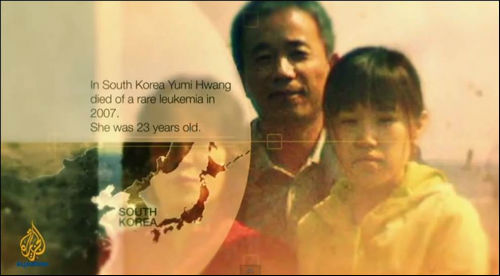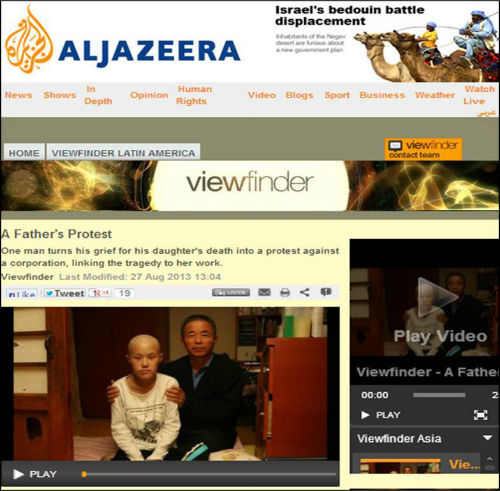故황유미 父황상기씨 출연 다큐 ‘탐욕의 제국’ 소개
아랍권 최대 위성방송인 <알 자지라>에 삼성반도체에서 근무하다 백혈병에 걸려 사망한 딸의 산업재해를 인정받기 위해 홀로 투쟁하는 황상기 씨의 일상을 담은 다큐멘터리가 소개됐다.
<알 자지라>는 27일(현지시간) “아버지의 투쟁(A Father's Protest)” 이라는 제하의 기사를 통해 홍리경 감독의 다큐멘터리 ‘탐욕의 제국’을 소개했다. 이 영화는 삼성 반도체 공장에서 일하다 백혈병으로 숨진 딸의 산업재해를 인정 받기 위해 거대 기업과 맞서 투쟁하는 황상기 씨를 주인공으로 한 다큐멘터리다.
<알 자지라>는 “한 남자가 딸을 잃은 슬픔을 딛고 나와 딸의 죽음이 그녀의 직업과 관련되어 있다며 회사를 상대로 투쟁을 벌인다”라며 지난 2007년 23세의 나이에 백혈병으로 사망한 故 황유미 씨의 사망 원인을 찾기 위해 삼성을 상대로 투쟁하고 있는 황씨의 이야기를 전했다.

<알 자지라>는 “백혈병의 가족 병력이 전혀 없었고, 황씨는 자신의 딸이 2년 가까이 반도체 공장에 근무하는 동안 독성의 화학물질에 노출되었기 때문에 죽었다고 믿는다”며 “이 다큐멘터리는 딸을 잃은 슬픔으로 고통받으며 왜 딸이 죽었는지의 이유를 찾아나선 슬픔에 젖은 한 아버지의 감동적인 여정을 보여준다”고 평가했다.
<알 자지라>는 이어 홍리경 감독의 ‘감독 노트’(리뷰)를 전하며 제작 의도와 내용을 소개했다.
홍 감독은 “삼성그룹은 79개의 계열사를 지닌 한국에서 가장 큰 가족경영 체제의 재벌기업”이라며 “삼성을 세계에서 가장 큰 반도체 공급업체로 선정한 수많은 보고서들이 있고 삼성의 휴대전화는 전 세계적으로 가장 인기 있는 제품으로 알려져 있다. 이러한 대단한 성과가 있었기에 한국의 언론은 삼성을 종종 ‘삼성 공화국’이라 부른다”고 영화를 소개했다.
홍 감독은 “유미의 사망 이후 황씨는 유미가 공장의 독성 화학물질에 노출되어 백혈병에 감염된 것으로 의심하기 시작했다. 유미의 사망에 대해 자체 조사를 하기로 결심했고, 유미의 동료들과 이야기를 나누고 근로자 중 다른 사망자가 있는지 질문했다”며 “그러나 삼성은 유미의 작업환경은 그녀의 죽음과 아무런 관계가 없다고 주장했다”고 밝혔다.
홍 감독은 언론의 외면에서도 어렵게 나간 몇 차례의 보도를 통해 여러 인권 단체들이 황씨의 투쟁을 도와주겠다는 제안을 해왔다며 정의를 찾아 나선 황씨의 일상을 그대로 보여준다고 설명했다.

이어 홍 감독은 “황씨는 속초시에서 택시 운전수로 일을 하며 한달에 두세번씩은 서울에 가서 딸 사진을 들고 삼성그룹 본사 밖에서 1인 시위를 벌인다”며 “이 다큐멘터리에서 개인적인 비극을 진실을 밝히는 일로 승화시킨 한 개인이 감명적인 이야기를 보여주기를 희망한다”고 밝혔다.
<알 자지라>의 ‘Viewfinder’는 전 세계 다큐멘터리의 발전을 도모하기 위한 프로젝트다. 비록 다큐멘터리 소개로 삼성의 이야기가 전해졌지만, 외신에 의해 삼성의 산업재해 이야기를 정면으로 다루었다는 점에서 주목을 받고 있다. (☞기사 원문 보러가기)
| 다음은 정상추 네트워크의 ‘알 자지라’ 기사 번역 전문. 번역 : 정상추 네트워크 소속 임옥 A Father's Protest 아버지의 투쟁 One man turns his grief for his daughter's death into a protest against a corporation, linking the tragedy to her work. Mr Hwang, a South Korean taxi driver, has been protesting against the government and a giant multinational corporation for more than five years, to find out why his daughter died of a rare form of leukaemia at the age of 23. There was no family history of the disease and Mr Hwang believes that his daughter died because she was exposed to deadly toxic chemicals at the semiconductor factory where she worked for nearly 2 years. The film follows a very emotional journey of a grieving father, who is dealing with the loss of his daughter, and is determined to find out why his daughter died. Filmmaker's view - LiGyeong Hong Mr Hwang is a modest taxi driver in Sokcho, which is about a four-hour drive from Seoul. Six years ago, he lost his daughter, Yumi, to leukaemia. I first met Mr Hwang when he was protesting in front of the headquarters of Samsung Electronics in the spring of 2011. Just before graduating from high school, Yumi started to work at a Samsung semiconductor factory. And twenty months later, she was diagnosed with acute leukaemia. During her battle with the disease, she told her father about her working conditions and that she was required to deal with toxic chemicals at the factory. This convinced Mr Hwang that Yumi's work environment was the reason for his daughter's illness. Samsung Group is South Korea's largest family-controlled conglomerate, with 79 affiliates in the country. There are numerous reports listing Samsung as the world's biggest semiconductor supplier, while the company's mobile phones are ranked most popular across the world. As a result of such tremendous success, the media in South Korea often refers to the company as "the Republic of Samsung". Samsung owes its achievements to its army of hard-working factory employees, especially as most factories operate on a three-shift work rota over 24 hours. Many of the employees are young female workers and Yumi, was one of them. Soon after Yumi's death, Mr Hwang started to suspect that she had contracted leukaemia as a result of exposure to toxic chemicals in the factory where she worked. To be sure, he decided to begin his own investigation into Yumi's death. He spoke to her colleagues and asked questions about other workers who had died. Samsung, however, insisted that Yumi's working conditions had nothing to do with her death but Mr Hwang was not convinced. He spoke to Korean media who were mostly dismissive and said they could not report anything unless Mr Hwang obtained convincing evidence that could prove that Yumi's working conditions caused her illness. But after a while, Mr Hwang succeeded in getting the case covered by two publications. Soon enough, other reports claiming to link Samsung factory working conditions to employee deaths, started surfacing elsewhere. And eventually, the coverage of Yumi's case resulted in civil rights organisations contacting Mr Hwang, offering to help him in his fight for answers. This doc-umentary follows Mr Hwang's daily life as he continues his quest for justice. He works as a taxi driver in Sokcho city and travels to Seoul two or three times a month, where with a photo of his daughter, he protests outside the Samsung Group headquarters. With this doc-umentary I hope to present the inspiring story of how one man deals with his personal tragedy by searching for the truth. |


